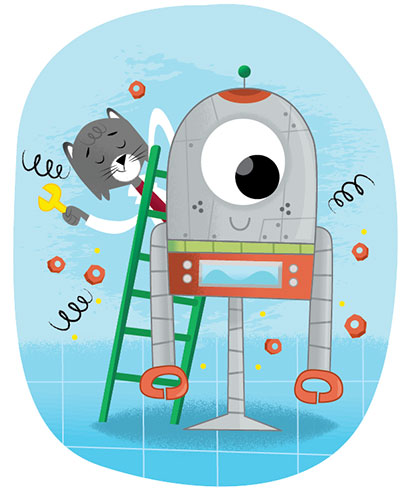Dear Hannah,
You’re enjoying some ice cream, when suddenly you feel a pain in your head that hurts a whole lot. It’s like it came out of nowhere, and in a matter of seconds, it’s gone.
These instant headaches, or brain freezes, often strike when we eat or drink something cold. And like you, some scientists are curious about why brain freezes happen. So they’re testing out some different ideas.
That’s what I found out from my friend Bill Griesar, a brain scientist at Washington State University.
One theory is that when you eat or drink something cold, it triggers a change in the blood vessels lining your mouth and throat.
Blood vessels are like little tubes carrying blood to the brain. A change in temperature can make these blood vessels grow wider.
“So you get this super painful rise and intense headache-y kind of feeling,” Griesar said. “The nice thing about ice cream headaches, is, very quickly, the vessels constrict. They go back to their normal size.”
As you experience a change in your blood vessels, it may set off other events in in your brain and body.
Griesar said brain freezes might be connected to an important nerve in your face. Our nerves help us move, think, and feel in all kinds of ways.
It just so happens Griesar and his students are learning about one nerve that helps the brain and face communicate: the trigeminal nerve.
The nerve stretches out across your face in three branches.
“One goes to a part of your mouth, one goes below your mouth, one goes around your eyes,” Griesar said.
Along these branches there are clumps of neurons called ganglia that help carry information from your face to your central nervous system.
Nerves and ganglia can help different parts of your head and body communicate. Because it stretches across your face, the trigeminal nerve might be why you can feel an ice cream headache in your eyes or nose, too.
The narrowing and widening blood vessels appear to put a lot of pressure on ganglia near the trigeminal nerve. The trigeminal nerve sends a message to the brain that you are in pain.
It may feel like the brain freeze is inside the brain, but it’s likely being experienced as pain in the face, and the meninges, which are layers of tissue, with pain-sensing neurons, surrounding the brain.
Nerves often communicate pain to warn us of something dangerous. But the pain from brain freezes doesn’t appear to be harmful.
We’ve still got more investigating to do when it comes to why exactly we get brain freezes. I think I’ll go do an experiment of my own at Ferdinand’s Ice Cream Shoppe. Here at Washington State University, they make my favorite ice cream. I’ll have to eat a bunch of it—in the name of research of course.
Sincerely,
Dr. Universe
 Got a science question? E-mail Dr. Wendy Sue Universe at Dr.Universe@wsu.edu. Tell her about your favorite ice cream. Ask Dr. Universe is a science-education project from Washington State University.
Got a science question? E-mail Dr. Wendy Sue Universe at Dr.Universe@wsu.edu. Tell her about your favorite ice cream. Ask Dr. Universe is a science-education project from Washington State University.